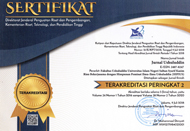Integration of Shariah and Hakikat in the Tijaniyyah Tarekat: An Analysis of Global and Local Acceptance Through the Perspective of Mīzān al-Shar
Abstract
Keywords
Full Text:
PDFReferences
Arifin, Karina, and R. Cecep Eka Permana. “Recent Rock Art Sites from West Sumatra, Indonesia.” Asian Perspectives 61, no. 2 (2022). https://doi.org/10.1353/asi.2022.0027.
Bashir Al-Tom Bashir, Al-Aṣsam, and Al-Tijani Ibrahim Muḥammad Ismail. “توظيف دلالة الاسم (العلم) في النصِّ الشِّعريّ عندَ المتنبي / The Employment of the Connotation of the Proper Noun in Al- Mutanabbi’s Poetic Text.” مجلة الدراسات اللغوية والأدبية (Journal of Linguistic and Literary Studies) 12, no. 2 (December 19, 2021): 112–38. https://journals.iium.edu.my/arabiclang/index.php/jlls/article/view/899.
Chin, A. H.B., Q. Al-Balas, M. F. Ahmad, N. Alsomali, and M. Ghaly. “Islamic Perspectives on Polygenic Testing and Selection of IVF Embryos (PGT-P) for Optimal Intelligence and Other Non–Disease-Related Socially Desirable Traits.” Journal of Bioethical Inquiry, 2023. https://doi.org/10.1007/s11673-023-10293-0.
Febianti, Hanisa, Desi Isnaini, and Aan Shar. “Implementation of Sharia Marketing Ethics at Bank Syariah Indonesia (BSI) Kc S Parman 2, Bengkulu City," Economist: Journal of Economics and Business 7, no. 2 (2023). https://doi.org/10.33087/ekonomis.v7i2.1298.
Ghazali, Nasrun Mohamad, Mohd Fuad Md Sawari, Bouhedda Ghalia, and Syed Musa Syed Jaafar Alhabshi. “The Fiqh Maxim Al-Ghunm Bi Al-Ghurm: A Critique On Interpretation Of The Maxim Relating To The Risk-Return Concept In Islamic Banking And Finance.” ISRA International Journal of Islamic Finance 16, no. 2 (June 28, 2024): 4–19. https://doi.org/10.55188/ijif.v16i2.412.
Hardivizon, and Muhammad Sholihin. “Hybrid Rationality behind Customers’ Choices of the Islamic Banks: An Experience of Bengkulu, Indonesia.” Journal of Islamic Thought and Civilization 11, no. 1 (2021). https://doi.org/10.32350/JITC.111.10.
Ismail, Nor Hazila, and Mohamed Eskandar Shah Mohd Rasid. “Promoting An Inclusive Economy: The Relevance Of Sustainable Development And Islamicity Prosperity Index.” Journal of Islamic Monetary Economics and Finance 8, no. 4 (2022). https://doi.org/10.21098/jimf.v8i4.1530.
Kamal, Islam Mohamed. “Ostensible PLS Trading Contracts a Comparative Analysis of Early Usury Circumventions in Judaism with Contemporary Islamic Financial Institutions’ Practices.” Journal of Islamic Accounting and Business Research ahead-of-print, no. ahead-of-print (January 1, 2024). https://doi.org/10.1108/JIABR-11-2023-0403.
Karamad, Hossein, and Ali Bamba. “فرقه تیجانیه و نقش آن در تعلیم و تربیت غرب آفریقا (ساحل عاج).” 12- Studies Religion Muslems 8, no. 15 (2022): 363–89. http://mam.journals.miu.ac.ir/article_7228.html.
Latif, Muhaemin, and Husnul Fahimah Ilyas. “Analyzing the Changing Dynamics of Tariqah Khalwatiah Samman (TKS) Political Influence in South Sulawesi, Indonesia.” Cogent Social Sciences 10, no. 1 (2024). https://doi.org/10.1080/23311886.2024.2330164.
Minaryanti, Annisa Adha, and Muhammad Iman Sastra Mihajat. “A Systematic Literature Review on the Role of Sharia Governance in Improving Financial Performance in Sharia Banking.” Journal of Islamic Accounting and Business Research, 2024. https://doi.org/10.1108/JIABR-08-2022-0192.
Mufid, Fathul, and Abd Hakim Mohad. “Indigenous Theosophy in Indonesia: Conception and Meaning of Mystical Philosophy in the Naqshabandiyyah Al Mrikiyah Text.” Qudus International Journal of Islamic Studies 10, no. 2 (2022). https://doi.org/10.21043/qijis.v10i2.16415.
Nouman, Muhammad, and Karim Ullah. Participatory Islamic Finance: Ideals, Contemporary Practices, and Innovations. Participatory Islamic Finance: Ideals, Contemporary Practices, and Innovations, 2023. https://doi.org/10.1007/978-981-19-9555-2.
Putra Saratian, Eko Tama, Harefan Arief, Yanto Ramli, Dudi Permana, and Mochamad Soelton. “Introduction Of Sharia Financing Contracts For The Indonesian Msmes.” ICCD 5, no. 1 (2023). https://doi.org/10.33068/iccd.v5i1.618.
Rosidi, Imron, Masduki, Ginda, Arwan, Darusman, Titi Antin, and Miftahuddin. “Ritual and Spirituality: The Tradition of the Tariqah Naqshabandiyyah Khalidiyyah Jalaliyyah in Indonesia." Afkar: Journal of Akidah and Islamic Thought 26, no. 1 (June 30, 2024): 191–218. https://doi.org/10.22452/afkar.vol26no1.6.
Rosidi, Imron, Eko Saputra, Khotimah, Avazbek Ganiyev, Masduki, and Abd Ghofur. “Negotiating Traditional Religious Authority In Indonesian Islam: The Case Of Madani Village.” Futura Islamic Scientific Journal 24, no. 1 (2024). https://doi.org/10.22373/jiif.v24i1.17320.
Yahya, Muhammad Fahri. “Integration of Jurisprudence and Sufism from the Perspective of Tarekat Tijaniyyah.” Journal of Ushuluddin Science Research 5, no. 3 (2020).
DOI: http://dx.doi.org/10.24014/jush.v33i1.36809
Refbacks
- There are currently no refbacks.
 Jurnal Ushuluddin Indexed By:
Jurnal Ushuluddin Indexed By:
Alamat Redaksi:
 Fakultas Ushuluddin UIN SUSKA Riau Jl. H.R. Soebrantas KM. 15,5 Panam – Pekanbaru
Fakultas Ushuluddin UIN SUSKA Riau Jl. H.R. Soebrantas KM. 15,5 Panam – Pekanbaru
 E-mail: jurnal.ushuluddin@uin-suska.ac.id
E-mail: jurnal.ushuluddin@uin-suska.ac.id
ejournal: http://ejournal.uin-suska.ac.id/index.php/ushuludin

Jurnal Ushuluddin is licensed under a Lisensi Creative Commons Atribusi 4.0 Internasional.

















